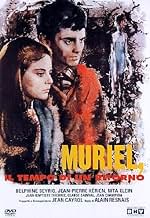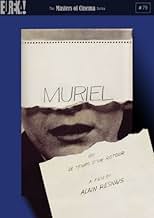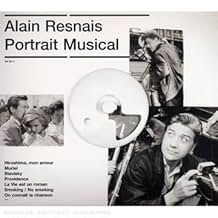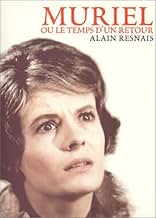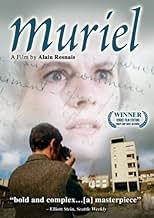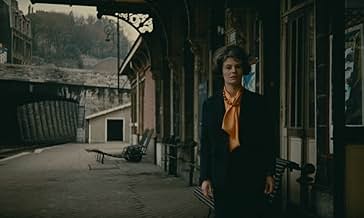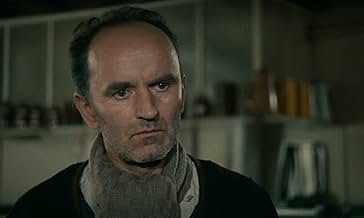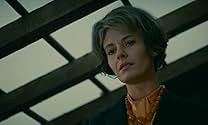Muriel ou le temps d'un retour
- 1963
- Tous publics
- 1h 57min
NOTE IMDb
7,0/10
4 k
MA NOTE
Dans la ville balnéaire de Boulogne, personne ne semble pouvoir faire face à son passé, surtout Hélène, une vendeuse de meubles anciens, son beau-fils Bernard, et son ancien amant Alphonse.Dans la ville balnéaire de Boulogne, personne ne semble pouvoir faire face à son passé, surtout Hélène, une vendeuse de meubles anciens, son beau-fils Bernard, et son ancien amant Alphonse.Dans la ville balnéaire de Boulogne, personne ne semble pouvoir faire face à son passé, surtout Hélène, une vendeuse de meubles anciens, son beau-fils Bernard, et son ancien amant Alphonse.
- Réalisation
- Scénario
- Casting principal
- Récompenses
- 3 victoires et 3 nominations au total
Jean-Baptiste Thiérrée
- Bernard Aughain
- (as Jean-Baptiste Thierrée)
Wanda Kerien
- La cliente
- (as Wanda Kérien)
Avis à la une
"Muriel" (1963) directed by Alain Resnais is a drama about the persistence of memory (aren't all Resnains' films? Incidentally, I named my review of "Hiroshima Mon Amour" that I saw about two years ago, "Persistence of Memory".)
Muriel of the title is dead by the time the movie begins, the victim of torture by the French soldiers during the occupation of Algeria. One of the soldiers, Bernard, is back in France living with his step-mother, Helene (Delphine Seyrig) in the province city Boulogne and hunted by the memories of war and Muriel. Helen deals with her own past and memories of Alphonse (Jean-Pierre Kérien), an ex-lover who comes from Paris to visit her in the company of his new 20-years-old girlfriend, Françoise (Nita Klein)
The story which Resnais tells is simple and the trailer for the movie gives a viewer a very good idea of what they are about to see: The Past. The present. The future - is it possible? Uncertainty. Suspicions. Lies. Four main characters, Helene, Alphonse, Bertrand, and Françoise are in search of what they are. There will be secrets and confessions. Is that time to love? The main theme of the film is reality vs. memory of it. Can we always trust ourselves with what we remember? Does our memory reflect the events the way they really happened or our vision of them is altered as time passes and new realities inevitably enter our lives?
What makes "Muriel" unique after all these years is the way the director presents the journey into the past of his characters, how they see it, and how it affects their present lives and the possibility (or rather impossibility) of love and happiness. Alain Resnains uses quick flashes of memory in the form of almost hypnotizing jump cuts of his genius cinematographer Sacha Vierny (Resnains and Vierny had made 10 films together). Vierny provided beautiful melancholic visual palette of washed out colors that created the atmosphere of unbearable sadness, loss, and hopelessness. Vierny who always underlined his preference for atmosphere over formal perfection, had said, "My satisfaction is that the photography is not remarked on too much for itself". The visual originality and innovation are accompanied by unusual unnerving soundtrack, eerie and haunting that adds to the understanding of guilt and remorse the film characters live with.
"Muriel" is a puzzling and multi-layered film that is easy to admire and meditate on. It is not entertaining or heart-warming and it is hard to identify with its heroes (or anti-heroes) but is always fascinating and rewarding and it may reveal its secrets after multiple viewings.
Muriel of the title is dead by the time the movie begins, the victim of torture by the French soldiers during the occupation of Algeria. One of the soldiers, Bernard, is back in France living with his step-mother, Helene (Delphine Seyrig) in the province city Boulogne and hunted by the memories of war and Muriel. Helen deals with her own past and memories of Alphonse (Jean-Pierre Kérien), an ex-lover who comes from Paris to visit her in the company of his new 20-years-old girlfriend, Françoise (Nita Klein)
The story which Resnais tells is simple and the trailer for the movie gives a viewer a very good idea of what they are about to see: The Past. The present. The future - is it possible? Uncertainty. Suspicions. Lies. Four main characters, Helene, Alphonse, Bertrand, and Françoise are in search of what they are. There will be secrets and confessions. Is that time to love? The main theme of the film is reality vs. memory of it. Can we always trust ourselves with what we remember? Does our memory reflect the events the way they really happened or our vision of them is altered as time passes and new realities inevitably enter our lives?
What makes "Muriel" unique after all these years is the way the director presents the journey into the past of his characters, how they see it, and how it affects their present lives and the possibility (or rather impossibility) of love and happiness. Alain Resnains uses quick flashes of memory in the form of almost hypnotizing jump cuts of his genius cinematographer Sacha Vierny (Resnains and Vierny had made 10 films together). Vierny provided beautiful melancholic visual palette of washed out colors that created the atmosphere of unbearable sadness, loss, and hopelessness. Vierny who always underlined his preference for atmosphere over formal perfection, had said, "My satisfaction is that the photography is not remarked on too much for itself". The visual originality and innovation are accompanied by unusual unnerving soundtrack, eerie and haunting that adds to the understanding of guilt and remorse the film characters live with.
"Muriel" is a puzzling and multi-layered film that is easy to admire and meditate on. It is not entertaining or heart-warming and it is hard to identify with its heroes (or anti-heroes) but is always fascinating and rewarding and it may reveal its secrets after multiple viewings.
This movie was made in the context of the revolution in the French cinema and novel which took place in the sixties. Just like the work of Margueritte Duras and Claude Simon whose novels avoided a straightforward narrative style, this movie tells its story in an episodic and almost surreal manner.
This can make it difficult going for anyone seeking a simple tale, well told. But, if your taste runs to the more abstract, there is a lot to like here. Like "Juliet of the Spirits" this movie is infused with an intensely subjective portrayal of the story which unfolds of a betrayed love, an act of war time atrocity, and the desparate plight of a compulsive gambler.
Excellent cinematography and direction make this movie a wonderful and richly textured work which deserves several viewings to appreciate completely.
This can make it difficult going for anyone seeking a simple tale, well told. But, if your taste runs to the more abstract, there is a lot to like here. Like "Juliet of the Spirits" this movie is infused with an intensely subjective portrayal of the story which unfolds of a betrayed love, an act of war time atrocity, and the desparate plight of a compulsive gambler.
Excellent cinematography and direction make this movie a wonderful and richly textured work which deserves several viewings to appreciate completely.
It's about 50 years since I first saw Muriel; in those days the wounds of the Algerian war were still fresh: bodies of Algerian immigrants were found floating in rivers, Sartre's apartment was fire-bombed because he'd supported Algerian independence and so on. Resnais had enough reason to make a film about those troubled days. The trouble with the film has to do with the uneasy juxtaposition of domestic drama (the unhappy love of Hélène and Alphonse) with the ordeal of Bernard and Robert in Algeria, and the dead girl over whom Bernard obsesses. The love story is so much more interesting than the political theme that we are left frustrated with the necessity of ignoring the latter to the benefit of the former.
Delphine Seyrig gives a wonderful performance as Hélène; she's always in movement, trying to calm Bernard down, trying to coax some emotion out of the stony Alphonse, on the phone with Claudie cadging some money to gamble at the casino (she's not good about repaying debts). Jean Champion shows up in the second half as Ernest, Alphonse's brother-in-law, trying to bring him back to a sense of his duties to his family. He sings that wonderful song at the lunch party, then launches into an angry tirade about Alphonse's dereliction of duty. It's a superb performance. Nita Klein as Françoise is appropriately prickly, analyzing her options as she sees Alphonse sliding away from her. Claude Sainval is very oily as de Smoke, a man who can't stop thinking about the money he's lost on a derelict building: ''can't even get the doorknobs from it''
Delphine Seyrig gives a wonderful performance as Hélène; she's always in movement, trying to calm Bernard down, trying to coax some emotion out of the stony Alphonse, on the phone with Claudie cadging some money to gamble at the casino (she's not good about repaying debts). Jean Champion shows up in the second half as Ernest, Alphonse's brother-in-law, trying to bring him back to a sense of his duties to his family. He sings that wonderful song at the lunch party, then launches into an angry tirade about Alphonse's dereliction of duty. It's a superb performance. Nita Klein as Françoise is appropriately prickly, analyzing her options as she sees Alphonse sliding away from her. Claude Sainval is very oily as de Smoke, a man who can't stop thinking about the money he's lost on a derelict building: ''can't even get the doorknobs from it''
Some decades before Haneke's 'Cache' once more centralised the trope of Algeria-guilt amongst the bourgeoisie, 'Muriel' is less a polemical allegory-and less marked by immigrant experience-and more a kind of spider's web of implication, its critique of French conduct in Algeria constructed as a kind of puzzle which is only really a puzzle if we ignore those political truths hiding in plain sight-which is precisely the point. Haneke is concerned to reveal his cards half-way through the film-it's important that one *get* and *absorb* a message. Likewise, in Muriel, the account of torture committed by the ex-soldier now returned to Boulogne-sur-Mer plays out at the half-way point. But for Resnais and scriptwriter Jean Cayrol, to whom the film equally owes its striking detail and shape, form and message are imbricated in closer ways. Likewise, compared to other experiments with narrative within avant-garde cinema of the period-including Resnais' own-here, complexities of perception rendered through avant-garde technique may reflect existential questions of memory, desire and so on, but more precisely, they serve a political purpose. As in Demy's Parapluies de Cherbourg the following year, the film's critique of French conduct in Algeria is presented as both motor to and peripheral figure / irritant within what is in some ways a love story. But there are no Michel Legrand songs here, no bright-burning neon glow, no dwelling in sentiment: the film is analytical, critical, clipped, dense. The constructs of desire, loss, the attempt to regain past intimacy, told in half-finished stories, never-received letters, interrupted monologues, the constant unspoken-the evasions and illusions of romantic love-are open secrets around which the lovers tip-toe, traipse and on which they trample, while the Algerian conflict is imbricated within the social fabric of a particular town, and, metonymically, the broader society in which it has its place. Of particular interest for the film is the way that the community of that town is constructed through a mixture of the repressed memory of trauma (the second world war and national service in Algeria-attack by or complicity with fascist occupation domestically and participation in colonial violence abroad), the militarist underlay of the business world, of Gaullism, of particular modes of masculine identity. The clipped precision of the film's extreme fast-cutting turns editing at once almost hallucinatory in its flashes of distorted logic and extraordinarily precise in its planned juxtapositions: the trope of mystery-who is Muriel? What happened in Algeria? What happened to break apart the now elderly lovers reunited in a web of half-truths, half-desires, and deceit?-a diagnostic frame at once personal and social. Resnais may suggest that film itself-at least, as conceived of as a repository of direct truth, the authenticity of visual experience-is inadequate: as when the young ex-soldiers' Algerian footage literally burns up in the projector when exposed to the light. But film, understood differently-for its challenge to, its going against the grain of perception-provides the shock to the habituated dailiness of looking so that an antique table, the door to a café, a walk around town, the assassination of a far-right terrorist, flicker and bunch up together like a terrible revelation of what lies beneath.
not for the casual DVD renter. Muriel is *not* entertainment but a film that demands that we endure its theatricality and embalmed atmosphere in order to reflect, along with Resnais, about various kinds of unbearable pasts, personal and national. The city of Boulogne is itself a character in Muriel, rebuilt and unrecognizable after the bombings of World War II...Helene (Delphine Seyrig) is an antique dealer whose home is her gallery--so she lives in a jumble of distant French pasts all the better to avoid her own. The "home movie" sequence is one of the few in French cinema of the 60s where the Algerian War is figured--but here, we see happy soldiers hanging out, images to send home (and to French TV), while the voice-over (Helene's stepson) recounts the rape and torture of the Algerian woman named in the title. Daring, in light of French censorship of any text that compromised state security during the "Algerian situation." Muriel will leave you with more questions than resolutions.
Le saviez-vous
- AnecdotesAt a press conference at the Venice Film Festival in 1963, Alain Resnais said that his film depicted "the malaise of a so-called happy society. ...A new world is taking shape, my characters are afraid of it, and they don't know how to face up to it."
- ConnexionsFeatured in Whiplash (2014)
Meilleurs choix
Connectez-vous pour évaluer et suivre la liste de favoris afin de recevoir des recommandations personnalisées
- How long is Muriel?Alimenté par Alexa
Détails
- Durée1 heure 57 minutes
- Mixage
- Rapport de forme
- 1.66 : 1
Contribuer à cette page
Suggérer une modification ou ajouter du contenu manquant

Lacune principale
By what name was Muriel ou le temps d'un retour (1963) officially released in India in English?
Répondre

